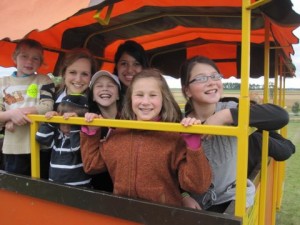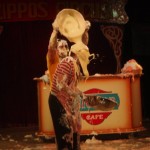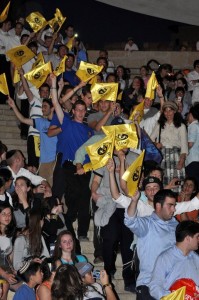By: Estie Neff
YouTube videos and wacky Jewish singers. Where would we be without them?
This past summer, Chai Lifeline’s Camp Simcha organized a major event. All their male campers and counselors, wearing Camp Simcha shirts and holding Camp Simcha flags, gathered in Times Square to sing their theme song, “Wavin’ Flag.”
As thousands of New Yorkers watched, the young cancer victims sang proudly at the top of their lungs. A video of the performance was posted on YouTube. Counselors told their friends and family about it, and soon the song became ubiquitous within the Jewish community.
Though I heard about the “Wavin’ Flag” phenomenon, I did not know the extent of its impact until I attended a concert over chol hamoed Sukkos featuring Dedi Groucher and Lipa Schmeltzer.
Lipa and Dedi are both known to be entertaining, and that night they met their match in a bunch of rowdy yeshiva boys sitting five rows behind me. The boisterous group kept up a steady stream of cheering, yelling, and their idea of musical accompaniment throughout the concert. The audience rolled their eyes and ignored them; the performers tried to coax them to silence.
The give-and-take between the yeshiva boys and the performers was painful at times, but the concert went on. Dedi impressed us with his vocal range, then gave the stage to Lipa. Lipa sang a number of popular songs and reached “Abi Meleibt” (It will be okay), one of his signature tunes. He sang the chorus, and the yeshiva boys simultaneously added their own noise as expected, breaking out in Camp Simcha’s “Wavin’ Flag.” Some people in the audience chuckled, some people groaned, but Lipa – surrounded by loud instruments and intense percussion – did not hear them.
As Lipa neared the chorus of “Abi Meleibt” the second time, he turned the microphone to the crowd. The band quieted down in anticipation of our cooperation. Instead, a resounding recital of “Wavin’ Flag” filled the cavernous room from the yeshiva boys in the back, who overpowered us.
Lipa did not miss a beat. “Oh! That’s nice! Sing it again!” he said, encouraging the yeshiva boys. They sang again, exuberantly, and this time Lipa sang with them. Next, the band chimed in with their thunderous instruments. Finally, the entire audience was singing the chorus of “Wavin’ Flag” together with the yeshiva boys, the band and Lipa.
Sitting in the concert hall, it struck me that two concepts were harmonizing together, in the form of music, at this spontaneous moment. Camp Simcha’s song about the lives and struggles of youth with cancer, and Lipa’s song about relinquishing control to life’s twists and turns, became one.
The haphazard melding of these musical messages was surprisingly appropriate. As mere human beings, we cannot control many things in life, like a person’s health – or a person’s livelihood, or when a person finds their bashert. But given a situation, we can react in the proper way by realizing that “it will be okay” – everything is God’s will and what He decrees is ultimately for the best.
The timing was perfect as well. During Sukkos, God commands us to eat and sleep in makeshift huts for seven days. Non-Jews think we’re crazy. It’s impossible to survive harsh weather conditions with only a palm branch roof and thin wooden walls! Sturdy houses provide ample protection from the environment – it would be a miracle if people lived in sukkahs as they do all year round.
However, living in a sturdy house is just as miraculous as living in a wooden hut! If God willed it, we would live in sukkahs all year and be just as secure. The sukkah teaches us that our realities are always subject to the will of Hashem.
Like a “wavin’ flag,” whose every move is determined by the one who brandishes it, the minutia of daily life is determined by the will of our Creator; therefore, we can say “abi meleibt!”
© Copyright 2010 Yeshiva University Observer

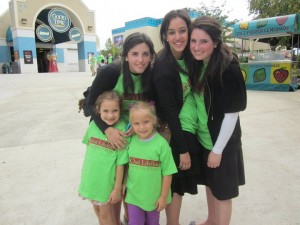
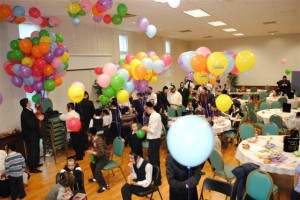
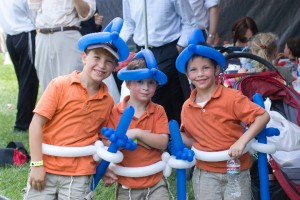 gs.
gs.